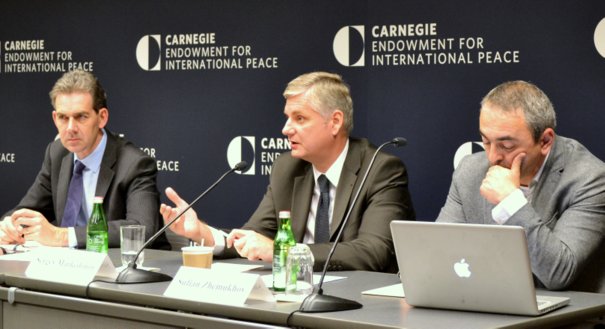Registration
You will receive an email confirming your registration.
The North Caucasus may be out of the headlines, but it remains the most turbulent part of the Russian Federation. Tension decreased after the Sochi Winter Olympics in 2014, but there are still frequent reports of violence in Dagestan and October 5 saw a rare terrorist attack in the Chechen capital of Grozny. Reports that many North Caucasian volunteers have joined the Islamic State’s forces in Iraq and Syria are re-awakening interest in the region. In response to these developments, Moscow-appointed leaders such as Ramazan Abdulatipov in Dagestan and Yury Kokov in Kabardino-Balkaria are trying different tactics to maintain control.
Carnegie hosted a discussion on the current situation in the North Caucasus with Sergei Markedonov, who was recently in Dagestan, and a leading expert from the region, Sufian Zhemukhov. Carnegie’s Thomas de Waal moderated.
Thomas de Waal
Thomas de Waal is a senior associate in the Russia and Eurasia Program at the Carnegie Endowment, specializing primarily in the South Caucasus region, comprising Armenia, Azerbaijan, and Georgia and their breakaway territories, as well as in the wider Black Sea region.
Sergey Markedonov
Sergey Markedonov is an associate professor at Russian State University for the Humanities and expert of the Russian International Affairs Council. He is an expert on the Caucasus, as well as the Black Sea, regional security, nationalism, interethnic conflicts and de-facto states in the post-Soviet area. From 2001 to 2010, he worked as head of the Interethnic Relations Group and deputy director at the Institute for Political and Military Analysis in Moscow and he also held teaching positions at the Russian State University for the Humanities, Moscow State University, and the Diplomatic Academy. From 2010 to October 2013 he was a visiting fellow in the CSIS Russia and Eurasia Program in Washington, DC.
Sufian Zhemukhov
Sufian Zhemukhov is a visiting fellow at George Washington University. He has a PhD from the Institute of Ethnology of Russian Academy of Science in 1997. He worked in Nalchik as director of the Teacher Training Institute (2000–2004), and editor-in-chief of the newspapers Kabardino-Balkarskaia Pravda (2006–2007) and Voice of Kabarda (since 2011). He is a former Kennan-Fulbright Scholar and received fellowships from the U.S. Institute of International Education and the U.S. Holocaust Memorial Museum. His research interests include Islam in the North Caucasus, theory and practice of nationalities, and the problems in the Circassian world.
